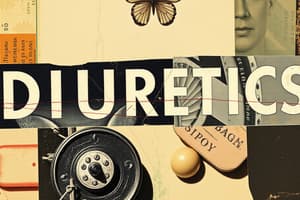Podcast
Questions and Answers
Which of the following medications acts on the loop of Henle to block sodium reabsorption?
Which of the following medications acts on the loop of Henle to block sodium reabsorption?
- Hydrochlorothiazide
- Frusemide (correct)
- Spironolactone
- Dapagliflozin
Which of the following medications is indicated for the treatment of hypernatremia?
Which of the following medications is indicated for the treatment of hypernatremia?
- 50% Dextrose
- 0.9% N/S
- 0.45% N/S (correct)
- 10% Dextrose
Which of these medications is a hormone directly responsible for stimulating red blood cell production?
Which of these medications is a hormone directly responsible for stimulating red blood cell production?
- Vitamin D
- Spironolactone
- Albumin
- Erythropoietin (correct)
Which of the following medications is used to increase osmotic pressure and retain fluid intravascularly?
Which of the following medications is used to increase osmotic pressure and retain fluid intravascularly?
Which of these medications is indicated for the management of potassium deficiency?
Which of these medications is indicated for the management of potassium deficiency?
Which medication is a dopamine precursor and used for Parkinson's disease?
Which medication is a dopamine precursor and used for Parkinson's disease?
Which of the following medications is indicated for both seizures and nerve pain?
Which of the following medications is indicated for both seizures and nerve pain?
Which medication suppresses gastric acid secretion?
Which medication suppresses gastric acid secretion?
Which of the following medications is used as a first-line treatment for Type 2 Diabetes Mellitus (T2DM)?
Which of the following medications is used as a first-line treatment for Type 2 Diabetes Mellitus (T2DM)?
Which medication alters osmosis and reduces intracranial pressure (ICP)?
Which medication alters osmosis and reduces intracranial pressure (ICP)?
Which medication is used to treat both seizures and bipolar disorder?
Which medication is used to treat both seizures and bipolar disorder?
What is the mechanism of action of Phenobarbital?
What is the mechanism of action of Phenobarbital?
Which of the following medications is a histamine 2 blocker?
Which of the following medications is a histamine 2 blocker?
Flashcards
What is a SGLT2 inhibitor?
What is a SGLT2 inhibitor?
A medication that lowers blood glucose levels by preventing the kidneys from reabsorbing glucose back into the bloodstream. This helps to remove excess glucose from the body.
What is a loop diuretic?
What is a loop diuretic?
A type of diuretic that works in the loop of Henle, blocking the reabsorption of sodium and water, leading to increased urine output.
What is the role of Erythropoietin?
What is the role of Erythropoietin?
A hormone that stimulates the production of red blood cells, crucial for oxygen transport in the blood.
What is a crystalloid solution?
What is a crystalloid solution?
Signup and view all the flashcards
What is a hypotonic solution?
What is a hypotonic solution?
Signup and view all the flashcards
What is a diuretic?
What is a diuretic?
Signup and view all the flashcards
How does Mannitol work?
How does Mannitol work?
Signup and view all the flashcards
What is Naloxone?
What is Naloxone?
Signup and view all the flashcards
How does Naloxone work?
How does Naloxone work?
Signup and view all the flashcards
What is Sodium Valproate?
What is Sodium Valproate?
Signup and view all the flashcards
What is Phenobarbital?
What is Phenobarbital?
Signup and view all the flashcards
What is Phenytoin?
What is Phenytoin?
Signup and view all the flashcards
What is Levodopa?
What is Levodopa?
Signup and view all the flashcards
Study Notes
Diuretics
- Mannitol: Alters osmosis, reducing water volume and intracranial pressure (ICP). Used for cerebral edema, increased ocular pressure. Risks include fluid leaking back into interstitial spaces, potentially worsening cerebral edema.
Opioid Antagonist
- Naloxone: Blocks opioid effects at mu opioid receptors, preventing G protein coupling. Used for opioid overdose. Quick onset, short-acting, requiring repeated dosing.
Anti-Seizure Medications
- Sodium Valproate (Epilim): Increases GABA, blocks sodium channels. Used for seizures, epilepsy, and mania.
- Phenobarbital (Barbital): Enhances GABA action, reducing seizure spread. Used for epilepsy and sedation.
- Phenytoin (Dilantin): Modulates sodium channels, stabilizing nerve excitability. Used in tonic-clonic seizures and post-surgery.
- Carbamazepine: Reduces nerve impulses, treating seizures, nerve pain, schizophrenia, and bipolar disorder.
- Gabapentin: Blocks nerve signals, treating seizures and nerve pain. Associated with risks of dependence and suicidal thoughts.
- Lamotrigine: Modulates sodium channels, reduces glutamate release. Used for seizures, nerve pain, and bipolar disorder.
Dopamine Precursor and Decarboxylase Inhibitor
- Levodopa (Sinemet): Converts to dopamine in the brain, used for Parkinson's disease.
- Carbidopa: Inhibits peripheral conversion of levodopa.
Sedative
- Midazolam: Acts on GABA A receptors, calming the brain. Used for seizures and anesthesia.
Gastrointestinal (GIT) Medications
- Histamine 2 Blockers (Ranitidine, Famotidine): H2 receptor antagonists inhibit gastric acid production. Used for gastric ulcers, heartburn, and GERD.
- Anti-Diarrheal (Loperamide): Activates opioid receptors in the gut, reducing stool frequency. Used for diarrhea.
- Proton Pump Inhibitors (Pantoprazole): Suppresses gastric acid secretion. Used for GI lesions, ulcers, and GERD.
Laxative
- Lactulose: Prevents ammonia absorption, softening stools. Used for hepatic encephalopathy and stool softening.
Endocrine Medications
- Insulin (Short-Acting: Actrapid, Novorapid; Long-Acting: Solostar, Optisulin): Regulates glucose metabolism, lowering blood glucose levels. Used for Type 1 and Type 2 diabetes mellitus (T1DM, T2DM).
- Biguanide (Metformin): Reduces liver glucose production, increasing insulin sensitivity. First-line treatment for T2DM.
- Sulfonylureas (Glipizide): Increases insulin secretion. Adjunct for T2DM.
- SGLT2 Inhibitor (Dapagliflozin): Reduces glucose reabsorption in the kidneys. Used for T2DM, weight loss, and fluid management.
Renal Medications
- Diuretics (Loop Diuretic: Frusemide; Thiazide: Hydrochlorothiazide; K-Sparing: Spironolactone): Affect sodium reabsorption at different points in the nephron. Used for hypertension and chronic kidney failure.
- Erythropoietin (EPO): Stimulates red blood cell production. Used for anemia in chronic kidney failure or cancer.
Vitamin D
- Vitamin D: Increases calcium and phosphate absorption. Used for vitamin D and calcium deficiencies.
Colloid
- Albumin: Increases osmotic pressure, retaining fluid intravascularly. Used for fluid resuscitation, shock, and rehydration.
Electrolytes and Fluids
- Electrolyte (Potassium): Maintains muscle and nerve function. Used for potassium deficiency.
- Crystalloid Solutions (NS 0.9%, CSL, Dex5%): Match the osmolarity of blood, preventing fluid shifts. Used for fluid resuscitation and shock.
- Hypotonic Solutions (10% Dextrose, 50% Dextrose): Move water into cells. Used for hyponatremia and cellular dehydration.
- Hypertonic Solutions (0.45% N/S): Move water out of cells. Used for hypernatremia and to reduce intracranial pressure.
Studying That Suits You
Use AI to generate personalized quizzes and flashcards to suit your learning preferences.




